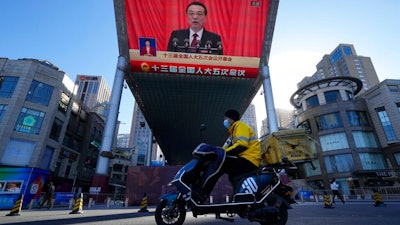
BEIJING (AP) — China on Saturday cut its annual economic growth target to its lowest level in decades as Beijing struggles to reverse a slump at a time when Russia’s war on Ukraine is pushing up oil prices and roiling the global economy.
The ruling Communist Party will aim for “around 5.5%” growth this year, down from last year's 8.1% expansion, the country’s No. 2 leader, Premier Li Keqiang, said in a report to an annual meeting of its ceremonial legislature. It noted commodity prices are surging but made no mention of the reason: the attack by Beijing’s friend, Russian President Vladimir Putin.
“Achieving this goal will require arduous efforts,” Li said during a 55-minute speech at the opening of the National People's Congress in the Great Hall of the People in central Beijing.
Surging energy costs due to the war add to pressure from anti-coronavirus controls and a crackdown on debt in China's vast real estate industry that caused economic growth to fall to 4% over a year earlier in the final quarter of 2021. This year's growth forecasts by the International Monetary Fund and private sector analysts are as low as 4.3%.
Manufacturing has been disrupted by a “zero tolerance” COVID-19 strategy that has at times suspended access to some major cities, as well as weak demand for Chinese exports and shortages of power and processor chips. The premier gave no indication Beijing might relax its anti-virus strategy that has helped to keep infection numbers low but at a rising cost.
President Xi Jinping's government has tried to distance itself from Putin’s war by calling for dialogue but refused to criticize the attack. Beijing has denounced trade and financial sanctions on Moscow and says Washington is to blame for the conflict.
Li indirectly acknowledged the war's impact on prices of oil, wheat and other commodities, saying they “remain high and prone to fluctuation," but gave no indication why.
“All of this is making our external environment increasingly volatile, grave and uncertain,” Li said.
His report focused on the economy, social welfare and other domestic issues, in contrast to Tuesday's State of the Union speech by President Joe Biden, which emphasized Russia's attack on Ukraine and international efforts to pressure Putin to stop.
The ruling party is trying to steer the world's second-largest economy toward slower, self-sustaining growth based on consumer spending instead of trade and investment but was alarmed by last year's abrupt slowdown.
The slide was triggered by tighter controls on borrowing by real estate developers that caused construction and housing sales to plunge.
Ruling party leaders responded by announcing a “policy pivot” in December toward shoring up growth and away from longer-term initiatives aimed at cutting debt and carbon emissions.
“We must make economic stability our top priority,” Li said. He said that should "occupy an even more prominent position.”
The premier promised to “ensure food and energy security” with adequate supplies of grain and electric power. He said Beijing will step up exploration for oil, gas and minerals and improve its system of stockpiles of essential raw materials.
Li also promised to crack down on trafficking of women and children and protect their “lawful rights.” The status of women who are mistreated and possible additional protections is expected to be discussed by the legislature following the widely publicized case of a woman who was found chained in a shed in eastern China.
No growth target was announced in 2020 after much of the economy was shut down to fight the virus. Last year’s target was “over 6%.” This year is the first time since the 1990s the official target is below 6%.
The ruling party has promised tax cuts for entrepreneurs who generate jobs and wealth. Banks have been told to lend more. The government is injecting money into the economy through higher spending on building public works.
The ruling party is promising to build more solar, wind and other renewable power resources. But it also has eased pressure on utilities to restrain growth of climate-changing carbon emissions by burning less coal.
Energy efficiency will be “assessed with appropriate flexibility," Li said.
Turning to COVID-19, Li said China needs to “constantly refine epidemic containment” but gave no indication Beijing might ease its “zero tolerance” strategy. He called for accelerating vaccine development and “strengthening epidemic controls” in cities where travelers and goods from abroad arrive.
All the delegates attending the opening session of the legislature wore face masks. The meeting, which normally lasts two weeks, has been curtailed to one week again this year because of the pandemic.
Also Saturday, the government announced a 7.1% increase in its military budget, up from last year's 6.8% rise. China has the world's second-highest military budget after the United States and is investing in long-range, nuclear-capable missiles and other weapons to extend its power beyond its shores.
Li affirmed the ruling party’s insistence that Hong Kong “should be governed by patriots,” a key element in a campaign to crush pro-democracy activism in the former British colony.
The premier indicated no change in stance toward Taiwan, the island democracy that Beijing claims as part of its territory and has threatened to invade. The two sides have been ruled separately since splitting in 1949 after a civil war but have multibillion-dollar trade and investment ties.
Russia’s invasion of Ukraine has prompted suggestions Beijing might be more likely to use force against Taiwan if it sensed a lack of resolve on the part of the United States and its allies. The ruling party has offered no signs of changing its avowed approach of gaining control of Taiwan by peaceful means, without giving up the military option.
Beijing will “advance peaceful growth of relations across the Taiwan Strait and the reunification of China,” Li said. “We firmly oppose any separatist activities seeking ‘Taiwan independence’ and firmly oppose foreign interference.”






















